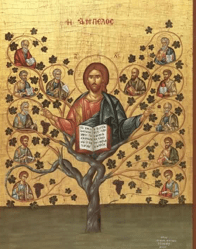God gives us every reason to trust Him. We read throughout both the Old and New Testaments that God is trustworthy not just a few times but many times. One such example is Psalm 145: “The LORD is trustworthy in every word, and faithful in every work.”
The Bible is also littered with plenty of examples of humanity deciding that God and His ways should not be trusted, doing things their way, and then suffering the painful consequences of their petulance and obstinacy. Here are just a few examples:
Adam and Eve disobey God, not because their lives aren’t all good and full of blessings, but because the serpent plants a seed of doubt in them about God’s love for them.
After growing impatient waiting to conceive Abraham’s child as God had promised, Sarah takes matters into her own hands and has Abraham lie with her maidservant Hagar so that Abraham may have the child God promised Him.
The Israelites create a golden calf and worship it despite the great miracles God performed for them simply because Moses took “too long” to return from his meeting with God at Mt. Sinai.
In Luke chapter 11, the Pharisees accuse Jesus of driving out demons with the help of Satan himself even after witnessing Jesus feed thousands with just five loaves of bread and two fish, bringing back to life the widow’s son, and healing many others.
So, why does this pattern, i.e. our continually turning our backs on God despite His proven faithfulness to us, keep repeating over and over throughout all of history and in our lives today? The short answer is because we provide Satan with an opening to drive a wedge, pride, between us and God. God is always trustworthy. How about us humans? Sadly not so much. St. Teresa of Avila says this well: “Consider seriously how quickly people change, and how little trust is to be had in them; and hold fast to God, who does not change.”
Satan, whom Jesus calls the “Father of Lies” (John 8:44) appeals to our pride and attachment to earthly vices to convince us that he is the one who is trustworthy, not God. After all, God doesn’t give us what we want when we snap our fingers so God must be lying when He tells us that He loves us. God even lets us suffer – what kind of love is that?! We are foolish to fall for these lies!!!
This is reminiscent of the scene from the Disney animated film, the Jungle Book, where Kaa, the serpent, hypnotizes the young boy Mowgli while singing: “Trust in me, just in me, shut your eyes, trust in me.” Kaa obviously doesn’t care about the well-being of the boy – he just wants to gain control of him to eat him. “Your opponent the devil is prowling around like a roaring lion looking for someone to devour” from 1 Peter 5:8 comes to mind as well.
The good news is that God gives us free will and Satan has no power over us. But we must grow in humility and recognize that we always need God’s help – God who is always trustworthy. St. Vincent de Paul provides great advice on this point: “The most powerful weapon to conquer the devil is humility. For, as he does not know at all how to employ it, neither does he know how to defend himself from it.”
Reflection based on the Mass readings for the 3rd Thursday of Lent 2015: Jeremiah 7:23-28, Psalm 95, and Luke 11:14-23)
Archive for the ‘16 Deacon Ruben Tamayo’ Category
In God We Trust?
In 16 Deacon Ruben Tamayo on 2016/09/02 at 12:00 AMThe “Parable of the Crabs” and the Vine of Christ
In 16 Deacon Ruben Tamayo on 2015/05/08 at 12:00 AMIn the Gospel of John, Jesus teaches us that He is the vine which sustains us, the branches, and calls each of us to “bear much fruit”. As I pondered what fruit our Lord asks us to produce it dawned on me that this fruit is ultimately the salvation of as many souls as possible, including our own. All of the other things which Jesus instructs us to do such as making “disciples of all nations, baptizing them in the name of the Father, and of the Son, and of the Holy Spirit” are meant to lead all of us to eternal life with God in Heaven.
As I reflected further, it reminded me of a story that I heard while having lunch with one of my clients. This client lived in a country which is rich in natural resources and people and is well situated geographically – factors which could serve as the foundation for peace and prosperity for its people. Sadly, his country was quite dysfunctional so I asked him why this was the case.

This led him to tell me what I call the “Parable of the Crabs”. In this story, a man goes out on a boat with a friend who makes a living catching and selling crabs. As the crabber hauls in a new batch of crabs, he puts some in a basket which is covered tightly with a lid and the others he puts in an open basket. After observing this for a while his friend asks him why he puts some crabs in one basket and some in the other.
The crabber explains that he puts the selfless crabs in the basket with the tight lid because they would otherwise escape and jump back in the ocean. “You see”, he says, “they collaborate with each other by climbing on each other’s backs until one reaches the top of the basket and then helps the others escape as well.”
“What about the crabs in the open basket – why don’t they escape as well?” asks his friend. The crabber informs him that these are the self-centered crabs which cannot stand to see each other succeed. As a result, they fiercely pull down any other crab that’s trying to climb out of the basket so he’s never had one escape. My client then said with sadness – my countrymen are like these crabs and that’s why we can’t seem to make much progress as a people.
This brings me back to our Lord’s command that we “bear much fruit”, the fruit of salvation for as many as possible. By using the image of us, the branches, being rooted in Himself, our Lord makes it clear that we cannot accomplish this mission without Him.
We do well to deepen our relationship with Him through prayer, the Sacraments, and loving acceptance of the suffering our Lord sends our way to help prune away our selfishness and any other impediments that keep us from loving God with our whole heart, with our whole being, and with our whole strength. As we become more deeply rooted in Christ, we grow in love of each other and begin to care for each other like the crabs that helped each other escape from certain death and be saved.
Those who become self-absorbed, like the crabs in the open basket, are on their way to perishing – to be thrown “into the fire” and to “be burned.” The more they make themselves the center of their universe, the less they are rooted in Christ and the more miserable and unhappy they become as they cut themselves off from God’s life giving love and from the love of others. Thanks to God’s mercy, He will welcome them back if they return to Him with a contrite heart. As members of our Lord’s Mystical Body, we are called to pray for and encourage all, especially those who have descended into the darkness and solitude that result from selfishness and pride.
Reflection based on the Mass readings for the 5th Sunday of Easter 2015: Acts 9:26-31; Psalm 22; 1st John 3:18-24; John 15:1-8
In God We Trust?
In 16 Deacon Ruben Tamayo on 2015/04/10 at 12:00 AM
God gives us every reason to trust Him. We read throughout both the Old and New Testaments that God is trustworthy not just a few times but many times. One such example is Psalm 145: “The LORD is trustworthy in every word, and faithful in every work.”
The Bible is also littered with plenty of examples of humanity deciding that God and His ways should not be trusted, doing things their way, and then suffering the painful consequences of their petulance and obstinacy. Here are just a few examples:
Adam and Eve disobey God, not because their lives aren’t all good and full of blessings, but because the serpent plants a seed of doubt in them about God’s love for them.
After growing impatient waiting to conceive Abraham’s child as God had promised, Sarah takes matters into her own hands and has Abraham lie with her maidservant Hagar so that Abraham may have the child God promised Him.
The Israelites create a golden calf and worship it despite the great miracles God performed for them simply because Moses took “too long” to return from his meeting with God at Mt. Sinai.
In Luke chapter 11, the Pharisees accuse Jesus of driving out demons with the help of Satan himself even after witnessing Jesus feed thousands with just five loaves of bread and two fish, bringing back to life the widow’s son, and healing many others.
So, why does this pattern, i.e. our continually turning our backs on God despite His proven faithfulness to us, keep repeating over and over throughout all of history and in our lives today? The short answer is because we provide Satan with an opening to drive a wedge, pride, between us and God. God is always trustworthy. How about us humans? Sadly not so much. St. Teresa of Avila says this well: “Consider seriously how quickly people change, and how little trust is to be had in them; and hold fast to God, who does not change.”
Satan, whom Jesus calls the “Father of Lies” (John 8:44) appeals to our pride and attachment to earthly vices to convince us that he is the one who is trustworthy, not God. After all, God doesn’t give us what we want when we snap our fingers so God must be lying when He tells us that He loves us. God even lets us suffer – what kind of love is that?! We are foolish to fall for these lies!!!

This is reminiscent of the scene from the Disney animated film, the Jungle Book, where Kaa, the serpent, hypnotizes the young boy Mowgli while singing: “Trust in me, just in me, shut your eyes, trust in me.” Kaa obviously doesn’t care about the well-being of the boy – he just wants to gain control of him to eat him. “Your opponent the devil is prowling around like a roaring lion looking for someone to devour” from 1 Peter 5:8 comes to mind as well.
The good news is that God gives us free will and Satan has no power over us. But we must grow in humility and recognize that we always need God’s help – God who is always trustworthy. St. Vincent de Paul provides great advice on this point: “The most powerful weapon to conquer the devil is humility. For, as he does not know at all how to employ it, neither does he know how to defend himself from it.”
Reflection based on the Mass readings for the 3rd Thursday of Lent 2015: Jeremiah 7:23-28, Psalm 95, and Luke 11:14-23)


